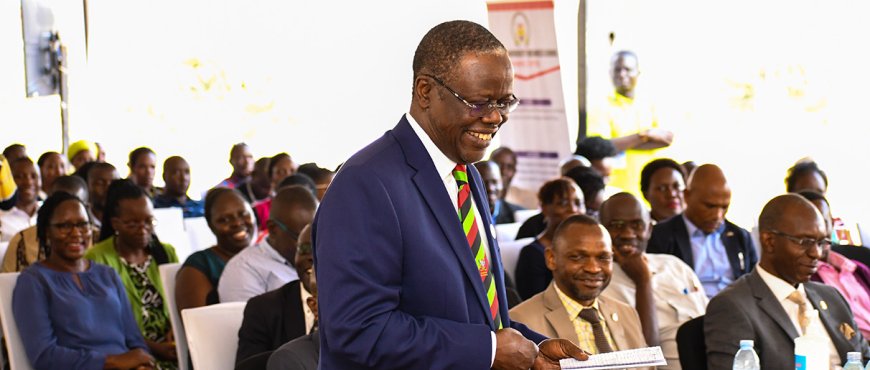How to Lead in a crisis and during turbulent times
A crisis is a major unpredictable event that has potentially negative results and is a threat to any organization according to Prof. Balunywa Principal, MUBS. He says it is a time of intense difficulty or danger that requires quick important decisions from a Leader because it causes confusion and anxiety arising from unusual circumstances.

KAMPALA - On March 11th 2023 during the weekly online Leadership training held every Saturday by the MUBS Leadership Centre, the Director Ms. Regis Namuddu hosted Prof. Waswa Balunywa Pricipal, MUBS who discussed the topic; “How to Lead in a crisis (Part 4); Leadership in Turbulent times”. There are different types of disasters that include the predictable ones and unpredictable ones. The predictable ones include fires, and volcanoes to mention but a few while the unpredictable ones include; train crash, plane crash, earthquakes, terrorist attacks, riots, and outbreak of global pandemics.
A crisis is a major unpredictable event that has potentially negative results and is a threat to any organization according to Prof. Balunywa Principal, MUBS. He says it is a time of intense difficulty or danger that requires quick important decisions from a Leader because it causes confusion and anxiety arising from unusual circumstances.
He adds that a crisis is any event that is going to lead to an unstable situation and is dangerous to an individual, group, community and the whole society at large.
Types of crisis include; personal/Individual, organizational, National, and International/Global. Prof. Balunywa says that Organizational Crisis is a sudden unplanned event that results into instability or another classification of a crisis is predictable or unpredictable.
Predictable Crisis (Routine Emergency) is one that is expected to happen and is a routine emergency because there is a degree of certainty that it will happen for example earthquakes, storms, fires etc. However, Prof. Balunywa cautions that the fact that it is a crisis, it has a degree of uncertainty especially on when not if and says for such predictable crisis, a Leader should use a Crisis Management Plan (mitigate and prevent) to manage it. Prof. Balunywa revealed that The Crisis Management Plan involves Preparation, Prevention, Identification, Recovery, and Monitoring.
The Unpredictable Crisis is one which is never anticipated. It is sudden and requires a quick plan although such a crisis has no plan to mitigate it. Prof. Balunywa added that this is where leadership excellence is very important.
A Crisis Management Plan is a process of identifying and responding to a threat and unanticipated event or negative disruption. It is also a process of dealing with a certain emergency situation. The Crisis Management Plan takes two formats according to Prof. Balunywa and these are;
a) Crisis Management Plan: How an organization responds to an occurrence, recovers from a crisis, sets procedures and protocols designed by an organization to respond.
b) Leading in a Crisis: The Unpredictable Crisis has no management plan and it is a call for authentic Leadership not Management that can overcome it according to Prof. Balunywa. Management is working through people to achieve goals whereas leadership is inspiring others to work towards achievement of a goal.
Below are the steps a Leader can apply to mitigate an Unpredictable Crisis according to Prof. Balunywa Principal MUBS:
1.Assess and define the problem
What is happening or what has happened? What kind of Crisis is it (natural, biological, technological?), and what are the threats to life?
2. Collect sufficient data
Prof. Balunywa says in order to understand the problem better, information is important. Information depends on two types of Crisis and it will help a Leader in decision making.
3. Evolve Strategy
Understand the challenge, develop alternative solutions, identify relevant technology to handle the challenge, be creative in seeking solutions to avert or mitigate the problem caused by the crisis.
4. Create Structure
Identify who will act, create teams where necessary, and assign responsibilities.
5. Communication
What should be done, who should speak, and who should be informed.
6. Act
Take action that is intended to solve the problems.
7. Monitor
What is the effect of the Crisis?
8. Revise where necessary
If the actions are not effective, be creative because there are no rules.
9. Recovery
Get back to normal, create a new normal or completely change the landscape.
In his closing remarks, Prof. Balunywa said Leaders need skills to manage any Crisis that include; Empathy, Self-confidence, Objectivity, creativity, and Communication among others.

































































































